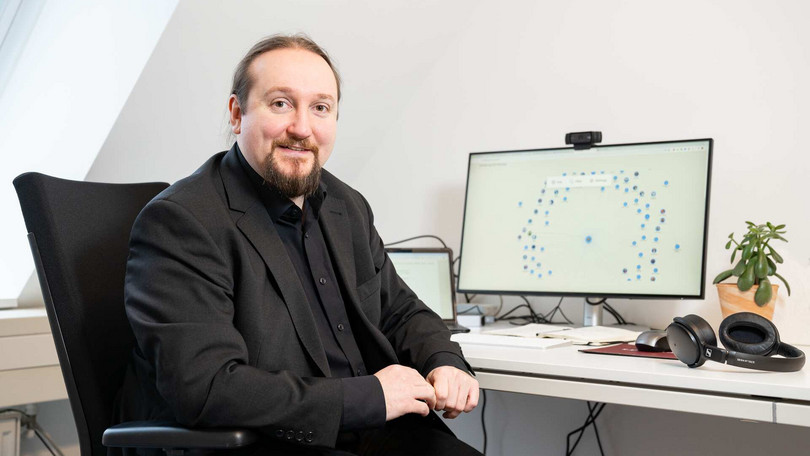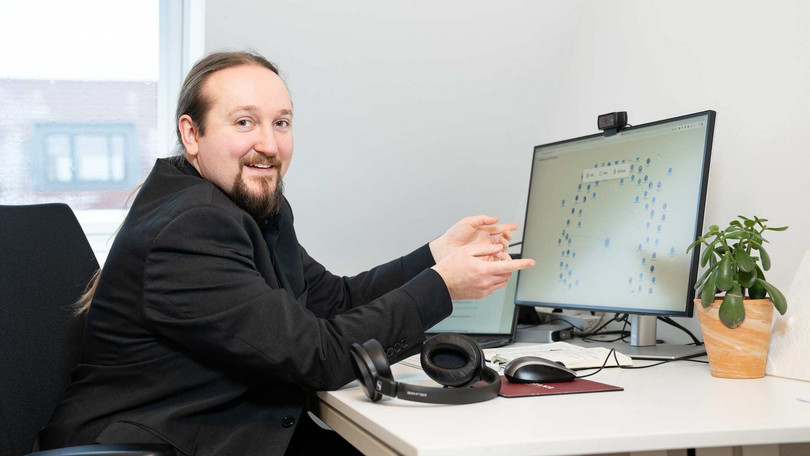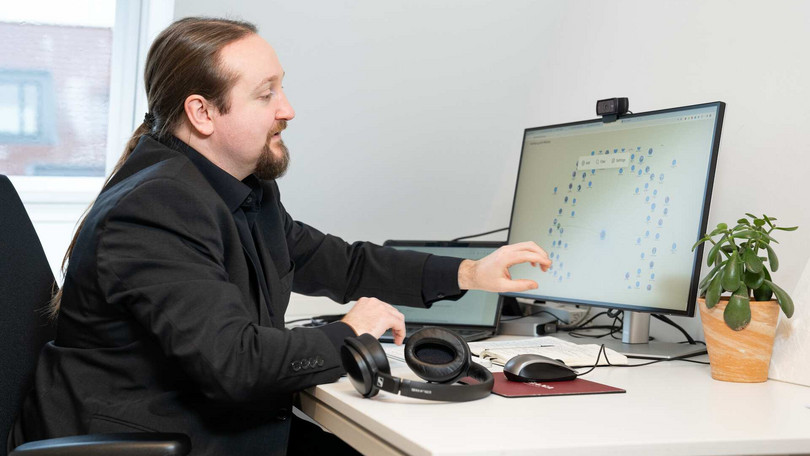New at Leuphana: Prof Dr Ricardo Usbeck - "AI does not replace people"
2024-03-11 The professor of business informatics, in particular artificial intelligence and explainability, makes machines understand what people say and write. This enables researchers to access sources in just a few minutes that could previously only be analysed manually and in a time-consuming process. Specialised sciences benefit enormously.
In the past, doctoral students often spent months poring over sustainability reports, archive texts or publications. The result was a data set that was just right for their own doctoral thesis. Artificial intelligence can now complete this task in minutes - and even more comprehensively. For example, AI searches for years of data on CO2 emissions from car manufacturers worldwide from PDFs and converts them into an easily understandable and networked data structure. Specialist scientists then analyse the data statistically: "We talk about knowledge graphs that we return to the researchers," explains Prof. Dr Ricardo Usbeck.
Large databases in business administration, for example, have so far largely contained quantitative data, such as balance sheet figures. With text analysis, qualitative data can be analysed on a large scale, for example on green washing. "We make machines understand what people say and write. We create structured databases from unstructured long texts," explains Ricardo Usbeck.
AI can simplify the entire research process. Ricardo Usbeck is part of the DFG joint project "NFDI4DataScience". NFDI4DS aims to support researchers in collecting, processing, analysing, publishing, archiving and reusing resources in data science and artificial intelligence. The overarching goal of NFDI4DS is to develop, establish and maintain a national research data infrastructure. A total of 14 universities are cooperating in NFDI4DS. The application is to be made accessible to scientists on the Internet. Researchers will then not only be able to search for publications, but also check their content. "It will then be possible, for example, to search for a specific method, a particular drug or side effects, even if they are not explicitly mentioned in the title or abstract," explains Ricardo Usbeck. This eliminates the need for time-consuming literature research.
Ricardo Usbeck's AI models are based not only on statistical probabilities, as in ChatGPT, but also on knowledge graphs. This connects knowledge nodes with each other and also recognises the significance of their relationship to each other. "The system generates a reliable knowledge base from the data," says Ricardo Usbeck.
He hopes that NFDI4DataScience will be stabilised and will be accessible to all scientists worldwide forever. In the next step, the programme could not only compile knowledge, but also generate suggestions, for example by telling a chemist the catalyst for the next experiment.
Artificial intelligence can also ensure greater safety. In the BMBF-funded "Rescue-Mate" project, Ricardo Usbeck and his team want to help the fire brigade to better protect citizens in Wilhelmsburg, for example, from flash floods. "AI can be used to coordinate emergency services," explains Ricardo Usbeck. To do this, the AI searches social media for relevant posts. So if someone has photographed a car and commented that it is floating away after a flash flood, the fire brigade immediately knows the coordinates of the scene of the accident and can move out.
In the "CoyPu" project, Ricardo Usbeck is working on an AI-based information platform for efficient crisis management in business. The system uses networked knowledge graphs and AI analysis tools to monitor supply chains, for example. "If a freighter is stuck in the Suez Canal, for example, companies have precise information about where their delivery is and whether they need to place a new order because their order will not arrive on time." The CoyPu platform is aimed at small and medium-sized companies, but will also be usable for more complex commercial systems. CoyPu is funded by the German Federal Ministry for Economic Affairs and Climate Protection.
"We have arrived in the future," sums up Ricardo Usbeck: "Thanks to AI, we can run comprehensive and powerful analyses. Yes, we also have to talk about the loss of certain jobs. But AI does not replace people. It only makes suggestions. People must be responsible for validating them. There is no ghost in the machine."
Ricardo Usbeck studied Computer Science (B.Sc.) and Computer Science (M.Sc.) at the Martin Luther University Halle-Wittenberg. He received his doctorate from the University of Leipzig in 2017. In Leipzig, he also worked as a research assistant at the InfAI - Institute for Applied Computer Science, where he supervised several national and European projects. Until 2019, he was a postdoctoral researcher at the University of Paderborn in the Data Science Group. He later became team leader at the Fraunhofer Institute for Intelligent Analysis and Information Systems IAIS Bonn with a new location in Dresden. In 2021, he took over the Junior Professorship for Semantic Systems at the University of Hamburg. In 2023, he was appointed Professor of Information Systems, in particular Artificial Intelligence and Explainability, at Leuphana University Lüneburg.



